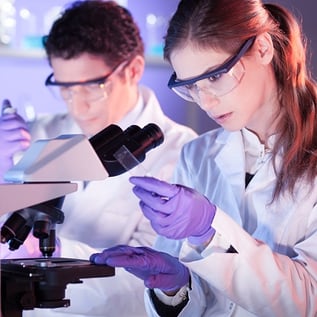 Have you been to the doctor recently and needed blood work or urine testing done, or perhaps some other type of testing? There’s a common phrase you, as a patient, may hear doctors frequently say: “I’ll send it to the lab.” It being some sort of patient sample (urine, blood, etc.) that was taken for testing, and lab being the clinical laboratory where the sample is sent to be tested. If your new to medical testing and have never been through this before, you may be wondering what is a clinical laboratory? What do they do there and what kinds of tests are run at a clinical lab? What should I expect in this process?
Have you been to the doctor recently and needed blood work or urine testing done, or perhaps some other type of testing? There’s a common phrase you, as a patient, may hear doctors frequently say: “I’ll send it to the lab.” It being some sort of patient sample (urine, blood, etc.) that was taken for testing, and lab being the clinical laboratory where the sample is sent to be tested. If your new to medical testing and have never been through this before, you may be wondering what is a clinical laboratory? What do they do there and what kinds of tests are run at a clinical lab? What should I expect in this process?
What is a clinical lab?
Generally, a clinical laboratory or medical laboratory is a place where tests are performed on clinical specimens (also known as a patient sample), such as blood or urine, and the results analyzed. These tests are performed in order to gather certain health information as it relates to a patient’s diagnosis, treatment, and prevention of disease.
The clinical laboratory staff may include pathologists, clinical biochemist, pathologist’s assistant, medical laboratory scientist, medical laboratory assistant, and phlebotomist. At Orchard Hospital, our competent laboratory staff are specially trained to handle patient specimens properly, test the samples, and analyze and interpret the results.
Laboratory testing can be extremely important in determining what is wrong (or not wrong) with an individual patient. Our Clinical Laboratory at Orchard Hospital is fully equipped and processes numerous patient samples for a variety of diagnostic purposes every day.
There’s many scenarios in which doctors and patients require medical testing and utilize clinical laboratory services. Here’s a few examples:
- You visit your primary care doctor because your throat’s been hurting and you’re not sure what’s wrong. He checks it out and suspects you have strep throat. He may conduct a throat swab and send the sample to the clinical lab for testing. Your doctor will then relay the results to you when he has them back from the laboratory.
- You visit your gynecologist because you suspect you may be pregnant. Your doctor has you use an over the counter pregnancy urine test and even though it turns out positive, he requires a blood test to confirm the pregnancy. He’ll refer you to a clinical lab to have the blood drawn and tested. Your doctor should receive the results back from the lab and go over the results with you.
- In other cases, though, your doctor may not be equipped at all for certain tests, so he will refer you to a lab or hospital to have the testing done. For example, your doctor suspects you have meningitis because you’re experiencing a host of troublesome symptoms. Sampling of cerebrospinal fluid through lumbar puncture (spinal tap) is essential for diagnosing meningitis. This kind of test is performed in a hospital by specialists, not by your primary care doctor in his office. You’ll go to the hospital to have the procedure done, the specimen will be sent to the clinical laboratory for testing and analyzing, and the results should be sent to your doctor. Once the results are in, he may have you back to his office to go over the results.
What other kinds of patient samples are tested at a clinical laboratory?
Depending on your doctor’s recommendation and what is going on with your health, your doctor may request one or more diagnostic tests which may require one or more specific patient samples.
Some common examples of patient specimen include:
- blood
- blood culture
- biopsy material
- cerebrospinal fluid
- ear swabs
- eye swabs
- stool samples
- fungal samples from hair, nail, skin
- nose swab
- throat swabs
- urine
- vaginal swabs
- wound swabs
What kinds of tests are run at a clinical laboratory?
At Orchard Hospital, we offer a wide range of on-site lab tests to make it convenient for you to get the testing you need.
Common blood tests include:
- CBC (complete blood count)
- Metabolic panel (blood sugar, hemoglobin A1c, liver and kidney function)
- Lipid panel (cholesterol, triglycerides)
- VAP cardiovascular panel and inflammatory markers
- Thyroid testing (TSH, T4, T3, fT3, fT4, rt3, TAB, TPO)
We also offer nutritional testing, annual physical exams and PAP tests, and urinalysis.
Our laboratory is also able to conduct specialty testing. Some examples are listed below:
- NTX testing for bone loss - urine analysis
- Salivary adrenal stress testing
- Candida Antibodies (yeast overgrowth)
- Comprehensive Stool Analysis for digestive analysis and bacterial / yeast overgrowth
- Essential Fatty Acid Analysis
- Estrogen Metabolites
- Fertility Testing
- Food Allergy Testing
- Heavy Metal Testing- urine
- Liver Detoxification Panel
- Plasma Amino Acids
- Urine Hormone Testing
- Urine Organic Acids
- Vitamin and Mineral Analysis
For routine tests, the Medical Specialty Center—Your Everyday Health Care Clinic—at Orchard Hospital will take care of you quickly and efficiently to obtain immediate results and avoid a lab visit.
Such tests include:
- Hemoglobin
- Blood glucose
- Urine dip sticks
- Pregnancy testing
- Strep throat testing
So next time you hear your doctor say, “I’ll send it to the lab”, the lab won’t be such a mysterious concept!
Always be sure to follow up with your doctor or lab regarding your test results. You play a vital role in your health care by becoming an active, involved, and informed member of your health care team. You can help us care for you by expressing your needs directly and giving us honest feedback on the quality of services you receive. We believe it takes teamwork to bring you the best care possible.
Orchard Hospital is a community sponsored hospital. It is a non-profit organization dedicated to serving our local communities. The Orchard Hospital Laboratory provides services to Gridley, Biggs, and surrounding communities. The Laboratory offers full service for inpatient, outpatient, and physician office referrals. It is our goal to have fast and friendly care while delivering accurate diagnostic testing. It’s our primary goal to provide you with quality care and make your stay as pleasant as possible.



